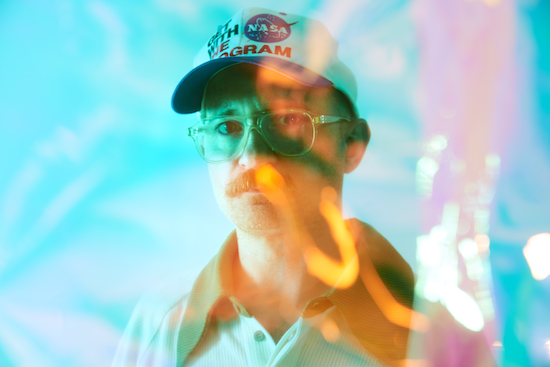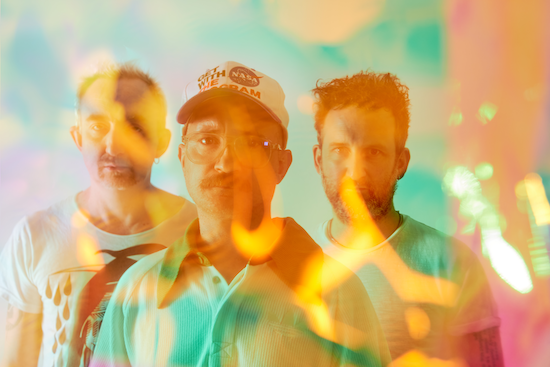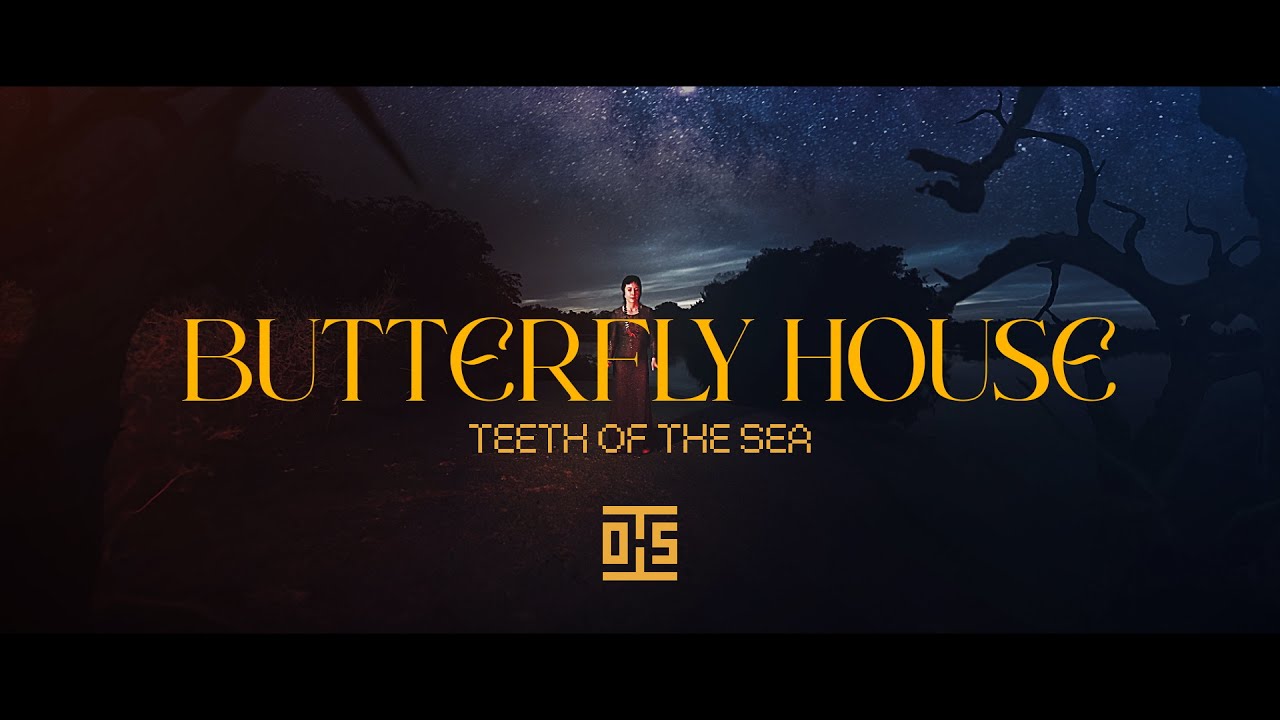Teeth Of The Sea by Al Overdrive
“We’ve accidentally made an uplifting record,” says guitarist Jimmy Martin. The pun is not intended, but given the overarching theme of space travel to Teeth Of The Sea’s new full-length album, “uplifting” certainly applies.
The seeds to Hive (out 6 October on Rocket) were sown when the band were asked to write a soundtrack to the Smithsonian Channel’s Apollo’s Moon Shot documentary to be performed at the London’s Science Museum on 21 June 2019. Despite coming straight off the back of touring their last album, Wraith and the fact they only had seven weeks to get two hours worth of music together, they accepted the offer. Always eager to explore new territory, such a deadline provided a strong impetus to get writing again.
From within these huge commissioned soundscapes emerged what has become known to the band as ‘The Apollo Suite’ – three tracks, each edited down from their original 10-20 minutes each, that offer a foundational structure to Hive. ‘Artemis’ and ‘Apollo’ act as bookends, with ‘Aether’, directly in the middle, anchoring the record. While the band have always strived to not repeat themselves, it is clear from the opening strains of ‘Artemis’ that Hive will be even more of a departure from what might be considered ‘their sound’ than anything they’ve released so far. ‘Artemis’ is nothing short of gorgeous – a majestic ascension into the unknown. Atmospheric blips set the scene for an arpeggiated synth; major key and music box-esque, a stately legato trumpet line soon weaving its way over the top.
With the eighty foot IMAX screen behind them while they played, showing images of "fucking space" no less, the band aimed for the awe-inspiring in their compositions. They succeeded, and on their own terms. Obviously there has been a long tradition of incorporating the concept of space travel into music, but even with the band being fans of much of it, they stuck with their desire to put their own stamp on the process rather than pay too much homage to Brian Eno’s Apollo: Atmospheres And Soundtracks or Ligeti’s music used in 2001: A Space Odyssey. “It felt high-stakes,” Martin explains. “There was a grandiose quality to it, where you’re overawed by the nature of the universe. And realizing that on such a mission you’re essentially all alone in what could be a life-ending situation. We wanted to get that loneliness and isolation across as well.” When it came time to start thinking about the new record, the band remembered how strong these pieces were, and set about seeing if they could implement a new album containing them in some form.
“Fundamentally, we’re all producers, and more of a producing unit than a band of three individuals,” bassist/trumpeter Sam Barton continues, as the conversation shifts to how Teeth Of The Sea runs things in the studio. Such a statement sheds further light on the new album title, pointing to the hivemind aspect of the group’s operations. Despite the aggression and air of the sinister that has been a large part of the band’s sound since their 2009 debut, Orphaned By The Ocean, the tension confines itself to the music rather than spilling over into their working methods. Martin and Mike Bourne, the man behind the electronics, also agree that they tend to think as one entity when it comes to what they want out of their creations. Amazingly, they’ve never had an argument over the merits of a track. “If it’s shit, all three of us instinctively know it’s shit,” Bourne explains, “and if it’s good, all three of us get really excited, and we persevere with that idea, pursuing it to its end point.” The trio are well aware of what a fortunate situation this is to be in. Though that’s not to say that they don’t offer each other critiques. “Sometimes in extreme ways,” Martin adds, who recalls the "combination of pep talks and criticism" that finally got the guitar solo on ‘Butterfly House’ as chaotic as it needed it to be.
It is notable that listeners have to wait until the very last track, ‘Apollo’, before they encounter a lot of guitar all in one go. Especially taking into account the band’s rock DNA, it is unusual to encounter an axeman who isn’t trying to slice up every bit of available space with his six strings. “My guitar heroes are quite often the same as everyone else’s – I love Jimi Hendrix and Eddie Van Halen, but I don’t necessarily wanna play like either of them. Instead, it’s been about trying to find different ways to approach the guitar without getting in the way of everything else and without using cliches.” Martin draws from such diverse influences as Labradford and the guitar playing on Angelo Badalamenti’s Twin Peaks soundtrack, taking a huge amount of inspiration from the unconventional styles of Robert Fripp, Richard Pinhas (more on him later), and Stian Westerhus.
Given the nature of the band’s sonic atmospheres, it is little wonder that much of the work is done in the editing process, with their unified aesthetic helping shape the sound. The mission statement behind it all is go where they’ve never gone before, and as the phrase "cliché-averse" pops up a few times during our talk, that means where others haven’t been either. Perhaps it’s an inevitable comparison considering the band’s use of trumpet over experimental grooves, but the spirit of 1970’s Miles Davis runs deep. Barton elaborates: “There was something in the water in the early 70s, wasn’t there? Can, Funkadelic, and Miles Davis were all trying to rip up the rulebook of a genre that had barely just been invented. That music was so forward-looking that it seems stupid to try and make stuff that sounds like it. The best tribute you can pay is to do your own thing completely.” Adding further inspiration from Cluster, Harmonia, and Tangerine Dream, this adventurousness has fueled Teeth Of The Sea since their beginnings.
That said, perhaps the most surprising thing about Hive is that there are two bona fide pop songs on it, complete with singing. Some very good singing too. In a language most listeners will understand, unlike the Latin lyrics of ‘Fortean Steed’ from their last outing, Wraith. Here, the tunes feature words that are both sung in English and audible. Thus far the band have chosen to bury such text in the mix. There are vocals on three tracks off the band’s third record, Master, though you’d be forgiven for still thinking of them as fully instrumental. The vocals to opener ‘Leder’ are run through heavy distortion whilst also being delivered in German, ‘The Servant’ features a spoken word story buried so low in the mix it is impossible to make out, and the band claim there are lyrics to ‘Responder’, which could be a reference to the vocoder-sounding sections, although it’s hard to tell. But we’re in different territory now. These vocals are front and centre – part of that fine tradition known as ‘the song’. And although they hadn’t attempted anything like this before, giving such a format a go is completely in line with the band’s openness to trying out new ideas. Once ventured, it felt both transgressive and “like scratching an itch” according to Martin. The guitarist had actually always wanted Bourne to take the mic on one of their records, recalling: “I’ve got a distinct memory of him singing ‘Calling Occupants Of Interplanetary Craft’ once while walking around the stockroom when we both worked at HMV, and being really struck by how great his pipes were.” Little did they know it then, but the subject matter of that Klaatu number, later made famous by Carpenters, would resonate with the record they’d be releasing in 2023. And so it is Bourne singing on the caustic electro stomper with overtones of star-crossed lovers standing on the observation deck of a star cruiser falling into a black hole, ‘Get With The Program’.
Bourne was also slated to sing ‘Butterfly House’. But the band, as a unit of course, noticed that something wasn’t working. Retiring to the pub to write lyrics, of which one draft was inspired by Penda’s Fen (the sui generis 1974 TV play), this now "Italo-disco track based around English pagan mythology" was in danger of becoming a novelty tune. So they gave their friend Kath Gifford (Snowpony, The Wargs, Sleazy Tiger) a call. They’d known Gifford for about a decade, though Martin recalls being a big Snowpony fan since 1996, putting their ‘Easy Way Down’ on “loads of mixtapes” back then. He eventually met her around 2013, and the two were briefly in a band together, their one and only gig opening for Thurston Moore (who was performing a set completely comprised of Fall covers). Teeth Of The Sea had previously enlisted the help of Gifford to sing Martin’s Latin text on ‘Fortean Steed’, but was given carte blanche to write her own, more modern, lyrics for this new piece. She would also perform these songs – something that thrilled the band, completely transforming the track and giving it new depths. Friend or not, it was unusual: the band don’t often let others in to their close-knit working process. “It has to be somebody that we trust implicitly,” Bourne explains. “Knowing what a talented and fantastic musician Kath is, we anticipated her contribution would be brilliant, and it was so much better. It was an extraordinary moment when we listened to what she sent over, a real revelation. It was like, ‘Fuck me, this is the best thing we’ve done.’”
Up next is ‘Liminal Kin’, sounding the most like the inner swarm of a beehive. Although the album title is taken from Frank Herbert’s 1973 sci-fi novel Hellstrom’s Hive, in which a population of insectoid humans attempt to colonize the world, it is actually Saul Bass’ 1974 film, Phase IV, that is the bigger influence on the record. All three band members enthuse over this “2001: A Space Odyssey with ants”, as Bourne calls it. Psychedelic cinema is very much ingrained in the group’s consciousness, with Jodorowsky also a major influence on the band. Not only his creations but how he creates, seeing no boundaries or limits to what can be achieved. When I mention Jodorowsky & Moebius’ The Incal, Bourne pulls the very book into view on the screen seconds later. No wonder the band’s sound is most often described as ‘sinister’ and ‘cinematic’.
The anchoring ‘Aether’ follows, the mission now having achieved that spectacular isolation Martin spoke of. Barton’s trumpet re-envisioning Miles’ Ascenseur Pour L’Échafaud soundtrack but removing Jeanne Moreau’s Florence from the Parisian night time and depositing her in a cosmic outpost, peering out at a vista of cosmic melancholy and unease.

Sam Barton
It’s back to the insects then with ‘Megafragma’. Nine-minutes-plus of head-frying psychedelia that gives ‘Responder’ a run for its money in terms of it being the band’s magnum opus. The title refers to a genus of wasp that includes some of the smallest insects known to man. The sound is anything but tiny however. From the shadows of a berserk synth figure pounce all the absent-until-now assassins, providing the menace we’ve come to love from the band. The track’s directive springs from those pivotal musical moments where you’re frying off your head and something comes through the speakers that absolutely blows your freaking mind. Martin explains: “We want ‘Megafragma’ to be that for somebody.” Harkening back to their own youths, it was first hearing Aphex Twin’s Selected Ambient Works 85-92 and Orbital’s brown album in such chemically altered states that provided the most memorable of these deep revelations.
With the elements of ‘Megafragma’ feeding off their own chaos, the band came to an impasse as to how to sculpt them, and so once again decided to enlist the help of a friend. Whilst the majority of their work is done with Giles Barrett at Soup Studios – a “liminal zone”, according to Martin, located on a boat on the Thames near East India Docks, giving the impression of being both in and outside of London simultaneously – for this one they spent a very hot day in the middle of the 2022 heatwave at Bear Bites Horse studio in Shoreditch laying down the ideas. But when it came time to mix, they brought it back to Barrett at Soup and left it with him to shape. All agree that what he came up with is fantastic, exactly what they wanted from the recording.

Mike Bourne
‘Powerhorse’ is the last of the pieces bound by “The Apollo Suite’”, and is once again a departure with its string synths, swooping bassline, and mid-80s hip-hop beat. To which Martin confesses an obsession with early Def Jam single, ‘The Rain’ by Oran “Juice” Jones. “I’ve been trying to emulate that drum machine part ever since I first heard it,” he reveals. One can also detect traces of Depeche Mode and Visage in the tune. Though true to the band’s disparate influences, the track’s thematically-fitting spoken word line – "I don’t believe there’s any future in cars" – is taken from Black Sabbath’s ‘Hole In The Sky’.
Closing out the album, ‘Apollo’ itself is a haunting beauty, evoking the toll such glimpses of the infinite must take on psyche. Recorded mostly live, Bourne provides an expansively layered atmosphere over which Martin lays down his melancholic guitar motif and Barton’s trumpet lets loose a lament both melodic and spine-chilling. The music swells until that crescendo abruptly ceases, eliminating all but the opening synth tones. Though one gets the sense that these will continue to drift on out to the further reaches of the cosmos, the mission far from over.

Jimmy Martin
Martin considers that all this constant sonic exploration may actually have worked against them over the years in terms of trying to build up an audience expecting any consistency of sound. Bourne allowing that their lack of any commercial success could be precisely what has granted them the freedom to continue on to these new realms. And though perhaps, to its shame, the world at large hasn’t cottoned onto Teeth Of The Sea’s awesomeness, many of the right people, including the band’s heroes, have. They’re still thrilled that none other than The Arch-Drude himself, Julian Cope, gave them their first ever review (“an amazing boost for our egos at the time,” Martin says), continuing on to write about their first three releases on his Head Heritage site, even featuring the Hypnoticon EP as his ‘Vinyl Of The Month’ in January 2010. More recently they had the "mind-blowing experience" of Richard Pinhas joining them in the studio. Pinhas, who has melded electronics with guitar playing over the course of his long and brilliant career, has naturally been a huge influence on Teeth Of The Sea. All use the word "mental" to describe the session in question, Bourne elaborating that “It was absolutely extraordinary. Simultaneously awe-inspiring and depressing. Having Richard Pinhas sit in the control room directly opposite you and play 25 minutes of the most incredible psychedelic guitar you’ve ever heard isn’t exactly what you want when you’ve just finished mixing session your own new album.” Barton adds: “[It was] like Maradona walking into a kids’ five-a-side game.”
Pinhas himself recalls the evening being a very pleasant experience, having great conversation over tea on the boat at Soup. The plan had been for him to play on an outtake from the album, but the band soon learned that’s not how the master operates, preferring instead to just go in and see what happens. So when Teeth Of The Sea get back from touring Hive they’ll commence working themselves into his spontaneous contribution. As per usual with all the artists involved, it is sure to be unlike anything else they’ve done before.
Hive is released on 6 October via Rocket Recordings. TOTS tour the UK soon



